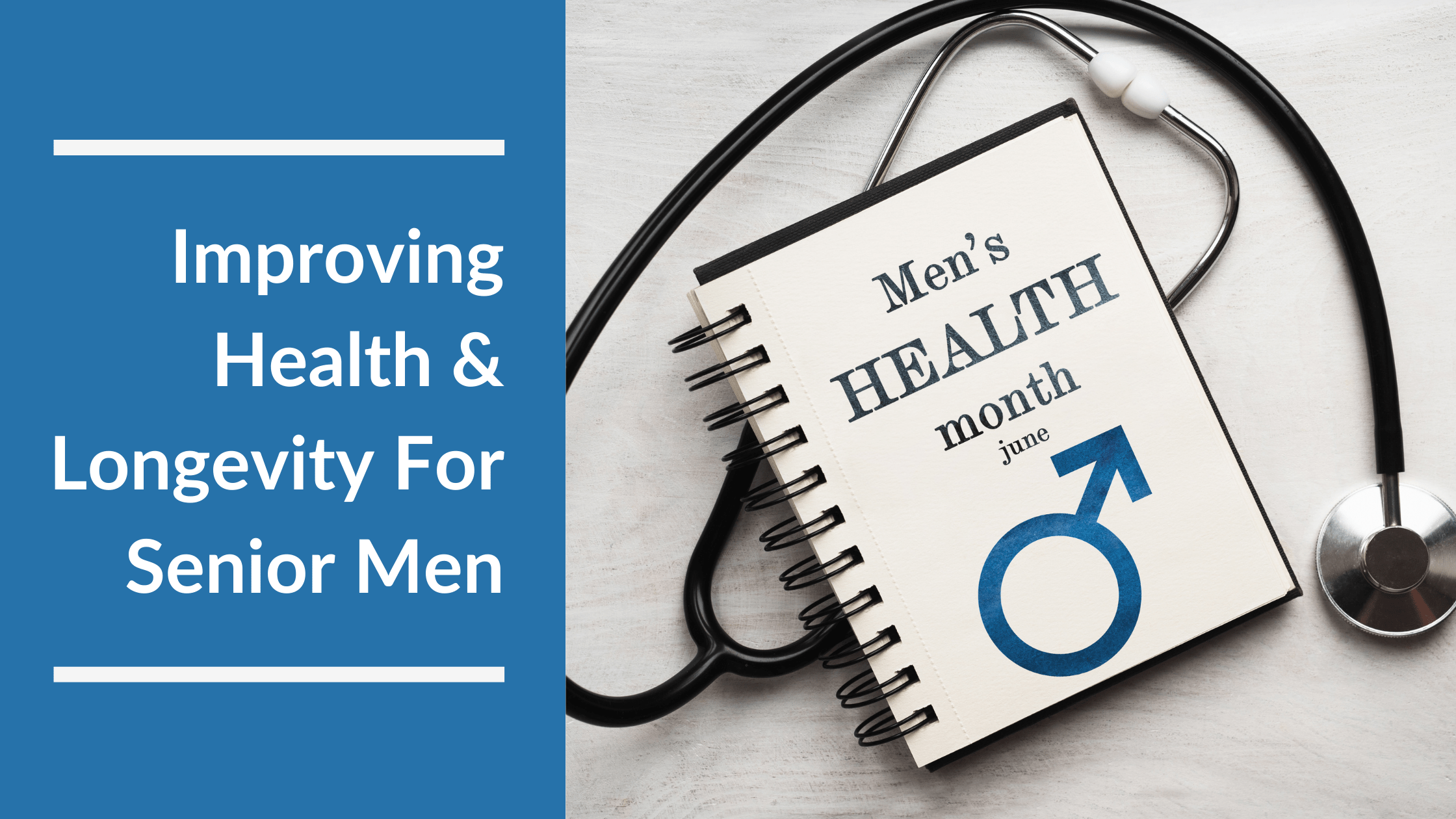
Throughout June, the Men’s Health Network and other groups promote awareness of preventable health issues and teach the importance of early detection and treatment for younger men through country-wide screenings and educational campaigns.
Updated June 6, 2022
Men's Health Month Raises Awareness & Education
The Men’s Health Network estimates that the average life expectancy of men is almost five years shorter than women. One reason is that men are more reluctant to see a doctor. Another is that men have a higher risk of developing certain conditions. Therefore, Men’s Health Month aims to raise awareness about preventable health conditions and inspire men to seek early detection and treatment.
This month is the perfect time for older men to empower themselves by reassessing their health and participating in screenings and educational opportunities. Additionally, it’s also a chance for doctors, other health care workers, and loved ones to give their patients and men in their lives the extra push to take control of their health and schedule routine doctors’ visits.
Men’s health is not an individual or gender-specific concern but one that has a much broader impact. For example, after Congress officially recognized Men’s Health Awareness Week in 1994, former Congressman Bill Richardson said, “Recognizing and preventing men’s health problems is not just a man’s issue. Because of its impact on wives, mothers, daughters, and sisters, men’s health is truly a family issue.”
“Recognizing and preventing men's health problems is not just a man's issue. Because of its impact on wives, mothers, daughters, and sisters, men's health is truly a family issue."
Former Congressman Bill Richardson

Facts About Men's Health
- Heart disease, cancer, depression, and a higher tendency to participate in risky behavior are among the most significant risks to men’s health.
- Men are more likely to be hospitalized or die from preventable conditions because they don’t visit their doctor as much.
- Men’s sexual health is most likely affected by dangerous substances and the natural aging process.
- Routine checkups and screenings are linked to better longevity and health in men.
Maintaining a healthy lifestyle is one of the best ways to prevent or manage many common health problems in men.
Men's Changing Health Needs
Men’s bodies never stop changing. Understanding these physical changes is essential to meeting your health needs. A few examples of these changes include:
- When testosterone levels start to fall, some men may see more hair growing in their ears and nose and less on their heads. Or, they may notice changes in how their body distributes fat.
- The body also produces more estrogen and estradiol levels, which affects muscle mass. Some men also experience lower libido and sexual function.
- As energy levels fall, men become less active and require fewer calories. However, their bodies can’t process nutrients simultaneously, so they must be more mindful of their diet.
- Many men develop a higher risk of heart disease, high blood pressure, and diabetes.
These changes can be upsetting, but they can be easier to accept when people know what to expect. Men’s Health Month aims to raise men’s understanding of these changes while bringing attention to preventable health conditions and promoting early detection and treatment.
Men's Health Month Recommendations
Demetrius Porche, DNS, RUN, and Editor-in-Chief of The American Journal of Men’s Health, told Morning Glory Home Care, “Men put their health last. Most men’s thinking is, if they can live up to their roles in society, then they’re healthy.”
Adult men should continually refresh themselves on health information, pay attention to their bodies, and schedule annual checkups. Doing so isn’t only necessary for a long life but a happier, more high-quality one, too.

"Men put their health last. Most men's thinking is, if they can live up to their roles in society, then they're healthy."
Demetrius Porche, The American Journal of Men's Health
Schedule Routine Screenings & Checkups
Of course, early diagnoses could prevent or treat many health issues in men. But unfortunately, men historically don’t see a doctor unless they have to. According to a Harris Poll survey for the American Academy of Family Physicians:
- 90% of men do not seek care or advice right away but wait before seeking treatment.
- 38% of men only seek healthcare when they are incredibly sick or when symptoms don’t go away on their own.
- 55% of men had not seen a doctor for a physical exam within the last 12 months.
- Of this group, 40% had one or more chronic health conditions.
- 40% of men follow their doctor’s advice 100% of the time.
- 58% follow their doctor’s advice 50 to 75% of the time.
Notably, married men have higher rates of screenings and doctor’s visits than single or cohabitating men. Therefore, it’s vital for families and caregivers of senior men who live alone to encourage them to seek preventative health services.
Recommended Health Screenings
Doctor’s visits aren’t just for when you feel unwell; they can help you avoid certain illnesses in the first place. For this reason, men should schedule routine screenings for:
- HIV
- Diabetes
- Depression
- Lung cancer
- Colon cancer
- High cholesterol
- High blood pressure
Seek Medical Help When Sick
Seeing a doctor when you are unwell is particularly crucial for older men. Yet research from the Health in Aging Foundation found that 40% of men who become sick put off seeing a doctor for several days, and 17% would delay “at least a week.”
Update Medication List
To ensure correct medication regimen adherence, seniors should keep a comprehensive list of prescribed medicine and doses. In addition, you should tell your practitioner about any medications so they can create a proper plan for your needs and avoid adverse drug interactions.
Stay-Up-To-Date On Vaccinations
Getting vaccinated is crucial at any age, but it’s especially important for seniors because the immune system declines as we get older, making it more difficult to fight off diseases and longer to recover.

Stick To A Healthy Lifestyle
As we age, our nutritional needs change. Senior men, in particular, need more calcium, vitamin D, fiber, and potassium. In addition, health experts typically suggest a 20% to 35% caloric intake from fats as well as the following caloric intakes:
- 2,000 for inactive men
- 2,200 to 2,400 for moderately active men
- 2,400 to 2,800 for active men
In the same vein, older adult men should try to include half an hour of physical activity into their day, five times a week, depending on mobility and physical capabilities. It doesn’t have to be a rigorous workout, either. Even taking a walk can be enough to satisfy the recommendations.
Plus, there are tons of indoor exercises for seniors for those days when you can’t get out of the house. The important thing is to do what you can to improve your strength, balance, and flexibility.
Use Sunscreen
Melanoma is the most common type of cancer and the most preventable. Unfortunately, nearly half of seniors are diagnosed with skin cancer in the US. However, being proactive can lower your risk and stop more damage from harmful UV rays. For example:
- Avoid prolonged sun exposure from 10 AM to 4 PM.
- Wear protective clothing, such as hats and sunglasses.
- Use SPF 50 or higher on any uncovered part of your body.
MeetCaregivers Supports Men's Health Month
The National Council on Aging found that about 80% of seniors ensure chronic health conditions like heart disease, cancer, stroke, and diabetes. But by eating right and getting active, you can alleviate or even prevent these issues, so your golden years truly shine.
We provide qualified professionals to assist with any needs you may have, so contact us at 1 (888) 541-1136 or visit the Find A Caregiver page. Then, visit our Blog to find new and helpful information about senior care.
- Elkins, C. (2013, May 15). Men’s Health – Life Stages, Common Conditions, Drugs & Devices. DrugWatch.com. Retrieved June 3, 2022, from https://www.drugwatch.com/health/men/
Last Modified: May 19, 2022. Medically Reviewed by Laura Koppen, PharmD, BCPS. - Harris Poll. (n.d.). A Survey about Men’s Health. AAFP.org. Retrieved June 3, 2022, from https://www.aafp.org/dam/AAFP/documents/media_center/charts-graphs/MensHealthExecSummary.pdf
- HealthAdvocate. (2015, June 15). National Men’s Health Month – Healthy Tips for Men. Blog.HealthAdvocate.com. Retrieved May 26, 2020, from https://blog.healthadvocate.com/2015/06/june-is-national-mens-health-month-healthy-tips-for-men/
- Henry Ford Health Staff. (2017, December 4). Men’s Health: Advice For Each Age And Stage. HenryFord.com. Retrieved June 3, 2022, from https://www.henryford.com/blog/2017/12/mens-health-each-age-stage
- Morning Glory Home Care. (2019, June 21). Proactive Healthcare Benefits Senior Men and Reduces Health Risks. MorningGloryHomeCare.com. Retrieved June 3, 2022, from https://morninggloryhomecare.com/proactive-healthcare-benefits/
- Modified June 21, 2021.
Senior Living Systems. (2018, May 28). Men’s Health Awareness Week. SeniorLivingSystems.org. Retrieved May 26, 2020, from http://www.seniorlivingsystems.org/mens-health-awareness-week/. - Unicity Healthcare. (2018, June 8). Men’s Health Month: Bringing Awareness To Men’s Health Issues During The Month Of June. UnicityHealthcare.com. Retrieved June 26, 2020, from www.unicityhealthcare.com/mens-health-month-bringing-awareness-mens-health-issues-month-june/
- Unicity Healthcare. (2019, July 21). Bringing Awareness in June to Men’s Senior Health. UnicityHealthcare.com. Retrieved June 3, 2022, from https://www.unicityhealthcare.com/june-is-mens-health-month-bringing-awareness-to-senior-male-health-issues/
